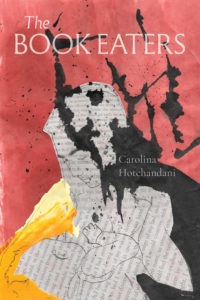 Review by Mindy Kronenberg
Review by Mindy Kronenberg
The poems in Carolina Hotchandani’s stunning debut comprise a woman’s journey to the self through many guises—daughter, scholar, mother, poet—and reveals how identity can be a fragile construct, whether inherited, imagined, or influenced by those who are deeply connected to us. These contemplative and elegantly crafted poems examine, in revolving sequences, the delicate process of reinforcing one’s identity in the sharing (and preserving) of familial and personal narrative, especially by those with fading memories who gave us life or whom we bring into this world and overwrite our stories with their own.
In “Once You Turn Eighty-Two,” (13) the poet declares to her father
I find myself mining you for the history
you lived through—
mining you the way they
suck from the earth to make theirs
the coal, the gold—the way they steal, too,
the wind from air—
There’s a poignant recognition of her father’s aphasia in several poems, worming its way through the memories that connect poet and parent and that keep them close to their cultural heritage. A childhood fable, once read aloud by her father to reinforce lessons on illusion and assumption, becomes a metaphor for the daughter’s longing to rescue the storyteller from his growing verbal entanglements. “As memory falters, stories tell and retell themselves/ through my father’s mouth. They’re in charge./ Like a skilled ventriloquist with a hand/ in his head.” (‘The Stories That Told You,” 6).
The frightening prospects of an aged parent’s vulnerability to ethnically targeted solicitations of a phone scam on reparations are found in “The Culprit,” 14 (“Tell me the story behind your name…//Can you spell it for me?…You were born in India before the Partition?/ Those were hard times.”) as well as issues of forgotten notes to stop buying things (“Eternal Pistachios,” 24) or needing a strategy to remind him that his wife is undergoing cancer treatments (“The Roman Room Method”). The urgency to summon a shared past, protecting memories from diminishment and an erasure of one’s presence, comes out in “I Become an Historian:” (27)
as my father repeats his questions,
forgets my answers–
as the years of my life become the wrinkles
his brain irons out.
I look for fabrics that easily crease—
linens, fine silks,
any cloth a single gesture crumples.
Remember this gesture, I want to say.
Fold and pleat and furrow yourself
as though we’ve shared a history.
As though it’s made a mark.
Hotchandani’s verbal alchemy conjures complex portraits of poet-as-mother, wielding elegantly imagistic snapshots of a woman’s wonderous ability to give and sustain life. In “Chiaroscuro,” (p. 36), her pregnancy takes on celestial proportions:
Against the sonogram’s black background, bones
glow like fragments of distant nebulae:
starlike hands, moonlike head, cratered where eyes
will later be set. I hold my camera
above the image; I want a photo
to send to my mom. There is no angle
that lets me capture this cluster of bones
from which the eye divines a human form.
The voice of the expectant mother beckons the voice of the daughter (“Because I Hear She Hears Me From the Womb,” p. 38) and the cycle of connectedness and conflict arises through balancing a schedule of breast feeding, teaching, and editing a work in progress (“Sense and Sensibility,“ p. 54; “Law of Conservation of Mass and Energy, “ p. 55). The particular challenge of women-as-artist-scholar-mother is keenly expressed in “Self-Portrait As A Woman’s Intention To Write,” (p. 62) with the conditional declarations painfully familiar in a creative female existence:
once she gives birth once the feeding’s over
once the baby sleeps once the crying
stops once the clothes are clean once the piles
are folded once her old clothes fit once the mind
is clear once the baby babbles once intention
buds once fatigue fades once the new
day starts once her body’s hers once the toddler
speaks once an hour cracks open
once the words surround her once a poem
grips her once the child’s at school
once the woman’s cry is louder than the child’s.
The Book Eaters contains poems that artfully articulate the complexity of a woman’s personal growth and reveals that the collage of who we are ultimately tethers us to ourselves.
The Book Eaters by Carolina Hotchandani
Perugia Press 2023
Paper, 97 pages,
ISBN978-0-9978076-7-7
Mindy Kronenberg is an award-winning poet and writer with numerous publication credits world-wide. She teaches writing, literature, and arts subjects at SUNY Empire State University, is the editor of Oberon poetry magazine, and the author of Dismantling the Playground (Birnham Wood), Images of America: Miller Place (Arcadia), and OPEN, an illustrated poetry book (Clare Songbirds Publishers).
